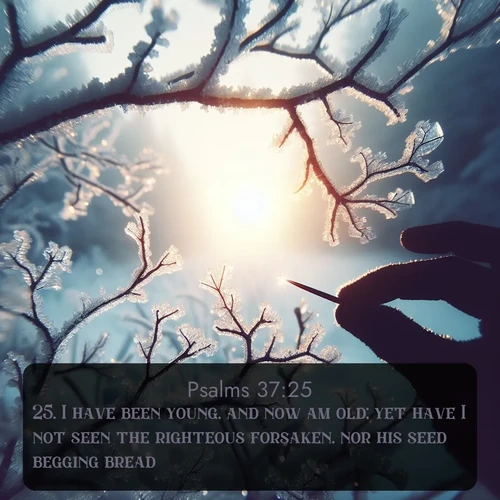Psalms 37:25 plusieurs versions / traductions
English Bible Translations
25. I have been young, and now am old; yet have I not seen the righteous forsaken, nor his seed begging bread.
25. I have been young, and now am old; Yet have I not seen the righteous forsaken, Nor his seed begging bread.
25. I have been young, and now am old, but I have not seen the good man without help, or his children looking for bread.
25. I have been young, and now am old, and I have not seen the righteous forsaken, nor his seed seeking bread:
25. I have been young, and now am old; yet I have not seen the righteous forsaken, nor his seed begging bread.
25. Young I have been, I have also become old, And I have not seen the righteous forsaken, And his seed seeking bread.
German Bible Translations
25. Ich bin jung gewesen und alt geworden und habe noch nie gesehen den Gerechten verlassen oder seinen Samen nach Brot gehen.
25. Ich bin jung gewesen und alt geworden und habe nie den Gerechten verlassen gesehen, oder seinen Samen um Brot betteln.
French Bible Translations
25. J'ai été jeune, j'ai vieilli, et je n'ai pas vu le juste être abandonné ni ses descendants mendier leur pain.
25. J’ai été jeune, j’ai vieilli;Et je n’ai point vu le juste abandonné,Ni sa postérité mendiant son pain.
25. J'ai été jeune, j'ai vieilli; Et je n'ai point vu le juste abandonné, Ni sa postérité mendiant son pain.
25. J'ai été jeune, et je suis vieux, et je n'ai pas vu le juste abandonné, ni sa semence cherchant du pain:
25. [Nun.] J'ai été jeune, et j'ai atteint la vieillesse, mais je n'ai point vu le juste abandonné, ni sa postérité mendiant son pain.
25. J'ai été jeune, et je suis devenu vieux; mais je n'ai point vu le juste abandonné, ni sa postérité mendiant son pain.
Versions with Strong Codes
Psalms 37 / KJV_Strong25.
Strong Code definitions
H1961 hayah haw-yaw a primitive root (compare 1933); to exist, i.e. be or become, come to pass (always emphatic, and not a mere copula or auxiliary):--beacon, X altogether, be(-come), accomplished, committed, like), break, cause, come (to pass), do, faint, fall, + follow, happen, X have, last, pertain, quit(one-)self, require, X use. see H1933
H5288 na`ar nah'-ar from H5287; (concretely) a boy (as active), from the age of infancy to adolescence; by implication, a servant; also (by interch. of sex), a girl (of similar latitude in age):--babe, boy, child, damsel (from the margin), lad, servant, young (man).see H5287
H1571 gam gam properly, assemblage; used only adverbially also, even, yea, though; often repeated as correl. both...and:--again, alike, also, (so much) as (soon), both (so)...and , but, either...or, even, for all, (in) likewise (manner), moreover, nay...neither, one, then(-refore), though, what, with, yea.
H2204 zaqen zaw-kane' a primitive root; to be old:--aged man, be (wax) old (man).
H3808 lo' lo or lowi {lo}; or loh (Deut. 3:11) {lo}; a primitive particle; not (the simple or abs. negation); by implication, no; often used with other particles (as follows):--X before, + or else, ere, + except, ig(-norant), much, less, nay, neither, never, no((-ne), -r, (-thing)), (X as though...,(can-), for) not (out of), of nought, otherwise, out of, + surely, + as truly as, + of a truth, + verily, for want, + whether, without.
H7200 ra'ah raw-aw' a primitive root; to see, literally or figuratively (in numerous applications, direct and implied, transitive, intransitive and causative):--advise self, appear, approve, behold, X certainly, consider, discern, (make to) enjoy, have experience, gaze, take heed, X indeed, X joyfully, lo, look (on, one another, one on another, one upon another, out, up, upon), mark, meet, X be near, perceive, present, provide, regard, (have) respect, (fore-, cause to, let) see(-r, -m, one another), shew (self), X sight of others, (e-)spy, stare, X surely, X think, view, visions.
H6662 tsaddiyq tsad-deek' from H6663; just:--just, lawful, righteous (man).
H5800 `azab aw-zab' a primitive root; to loosen, i.e. relinquish, permit, etc.:--commit self, fail, forsake, fortify, help, leave (destitute, off), refuse, X surely.
H2233 zera` zeh'-rah from H2232; seed; figuratively, fruit, plant, sowing-time, posterity:--X carnally, child, fruitful, seed(-time), sowing- time.see H2232
H1245 baqash baw-kash' a primitive root; to search out (by any method, specifically in worship or prayer); by implication, to strive after:--ask, beg, beseech, desire, enquire, get, make inquisition, procure, (make) request, require, seek (for).
H3899 lechem lekh'-em from H3898; food (for man or beast), especially bread, or grain (for making it):--((shew-))bread, X eat, food, fruit, loaf, meat, victuals. See also 1036.see H3898 see H1036
Prédications qui analysent les thèmes Psaumes 37
Thèmes : Confiance en Dieu; Déclaration des méchants; Promesse de délivranceRelated Sermons discussing Psalms 37
Themes : Confiance en Dieu; Déclaration des méchants; Promesse de délivrancesee also: Bible Key Verses ; KJV Bible Images, BBE Bible images

